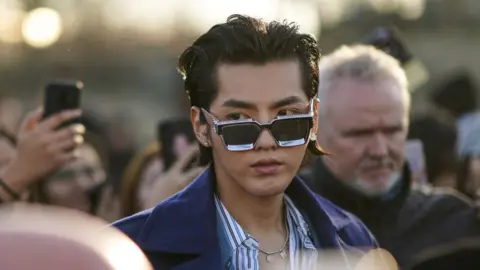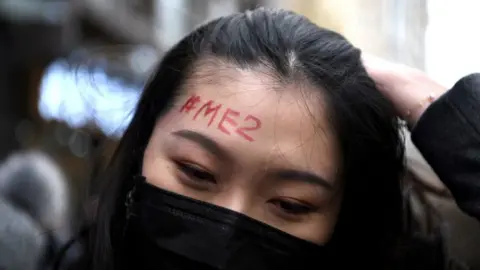Kris Wu: Why a superstar sparked China's sexual consent debate
 Getty Images
Getty ImagesA growing rape allegation controversy centering on one of China's biggest stars has dominated headlines in recent weeks - but also renewed conversations on sexual consent.
The fallout surrounding Chinese-Canadian actor and singer Kris Wu has been fast and furious.
After he was accused of rape by an alleged victim earlier this month, at least 24 more women have come forward alleging inappropriate behaviour.
More than a dozen firms - including global brands Louis Vuitton and Porsche - have severed ties with Wu and there are numerous calls for him to quit entertainment and leave China. The 30-year-old has denied all allegations.
The scandal rocked social media, as netizens devoured every twist and turn. But the case has become more than just tabloid fodder.
Support online for the women involved - especially for the main accuser, 19-year-old college student Du Meizhu - has been overwhelming.
This, say women's rights activists, is an encouraging sign that awareness of sexual consent is growing, in a country where female survivors are often victim-blamed.
'She did it to increase her visibility'
Since 8 July, Ms Du has been relentlessly posting her allegations on social media platform Weibo and also given several media interviews.
She said she met Mr Wu when she was 17, and alleged she was invited to his home along with other girls where they were pressured to drink alcohol. She said he had sex with her while she was drunk and unconscious.
Mr Wu has denied plying her with alcohol, and also rejected other allegations that he had enticed girls to have sex in return for benefits, raped girls while they were unconscious, and had sex with minors. Under Chinese law, under-18s are considered minors, while the age of sexual consent is 14.
Following initial investigations, Beijing police released a statement last week which confirmed some details of Ms Du's account - but only stated that she and Mr Wu "had sex" after drinking.
They added she had shared her story to "increase her online visibility".
Police said they were still investigating other claims against Mr Wu.
Since then, Ms Du has disputed the police's account, insisting that the sex was non-consensual as she had been forced to drink until she passed out, and was brought into Mr Wu's room by his manager.
She did not respond to a BBC request for an interview. But on Weibo she recently wrote a post, which was later deleted, that said: "I didn't take the initiative to go there! I didn't intentionally stay behind!
"I just want this to be over with, I'm so tired."
Many online commenters were outraged by the police statement, saying that the language was skewed in Mr Wu's favour.
"Summary: everything that Du Meizhu said was true," read one of the most-liked comments below the statement.
Another comment with 1.5 million "likes" said: "Let's count the number of people who don't believe Wu."
The police statement was a classic example of China's patriarchal culture, said women's rights activists.
Prominent Chinese feminist Lu Pin told the BBC: "From this, we can see what the government's attitude is... They won't recognise the legitimacy of female voices - and a woman speaking out is accused of 'wanting fame'."
 Getty Images
Getty ImagesThe incident comes as awareness of gender-based violence in China has grown, sparked by the #MeToo movement in 2018 involving prominent figures across different parts of society.
The increase in international coverage of such cases - including one of an intern who sued her boss - further cemented interest in the topic. Recently, the issue has also entered the mainstream via viral pop songs and TV shows, albeit with controversy.
This is even as the #MeToo campaign has been censored online over fears of social unrest.
This year, a new civil code came into effect, which for the first time defined actions constituting sexual harassment, and held organisations including businesses responsible for its prevention.
Critics have argued it is not enough to protect victims as it does not lay out guidelines for enforcement, but it is largely seen as progress.
"Combating sexual assault has now taken root in Chinese society... every single case will pave the road to change once it becomes a public topic," Feng Yuan, co-founder of Beijing women's rights group Equality, told the BBC.
Lu Pin noted that in the case of Kris Wu, the celebrity was alleged to have used his position of power to maintain "intimate relations" with Du for months.
The case, she said, has caused "people to have a deeper understanding of how those with influence in the entertainment industry can use their power in gender relations, and how this power can be controlled over a lengthy period of time."
#GirlsHelpGirls
Activists say this heightened awareness may be one reason why many have rallied behind Ms Du, and why other girls were emboldened to speak out.
The Weibo hashtag "What exactly is sexual consent" has racked up more than 380 million views in recent days.
Some pointed out the difficulty women faced in saying no to sexual advances. "A lot of times when women refuse, men will think they're just being bashful, that they 'want to say no while welcoming' men," said one commenter.
Many men said that they found women "confusing", claiming that in Chinese culture saying 'no' could also be "read as flirtatious behaviour".
"The problem is that in our culture, encouraging humility results in people rarely rejecting something outright. What should we do?" one user wrote.
Such comments sparked angry responses. "Don't try to use language or culture to get away with it. If someone did not give you an explicit yes, everything else should be seen as a rejection," someone said.
Another added: "Only yes means yes, and that 'yes' can be withdrawn anytime. Why is this so hard to understand?"
Meanwhile, others have called for more support for Wu's alleged victims using the hashtag "Girls Help Girls".
"Whatever Du's intentions are in telling her story, she's still a victim if it's true. You are brave, sister, for sharing it," one comment read.
As for Ms Du, she says she is awaiting justice.
"I want to pierce Wu's mask and prevent anyone else from being harmed. I hope I will be the last victim," she said in a recent post.
You might also be interested in:
Malaysian student Ain called out her teacher on social media for making a rape joke in class, but the move also sparked backlash against her for speaking out.
